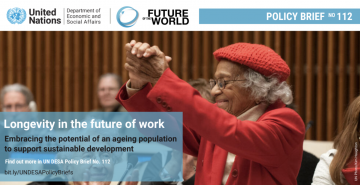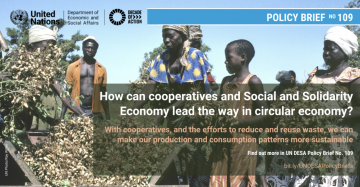Publications
Displaying 81 - 90 of 689
UN General Assembly Reports on Social Development |
UN General Assembly Reports on Social Development |
UN General Assembly Reports on Social Development |
The present report, which is submitted pursuant to General Assembly resolution 75/153, contains information on the preparations for the observance of the thirtieth anniversary of the International Year of the Family in 2024 and an analysis of the impact of new technologies on families. The report is also focused on the potential of digital technologies to help to enable the achievement of work-family balance and on the role of such technologies in promoting and facilitating parenting education.
UN General Assembly Reports on Social Development |
UN General Assembly Reports on Social Development |
Policy Briefs |
Emergence of new forms of work
‘Standard employment’—understood as regular, full-time, and subject to labour law—remains the prevailing form of employment in high-income countries, however, new forms of employment have been rapidly gaining ground since the early 2000s. While new forms of work enabled by digital technologies have rapidly been expanding in more advanced economies, they are also spreading to emerging economies, where the effects on the labour markets are likely to be different. For instance, studies show that platform work, one of the new forms of work, has the potential to increase employment opportunities, promote formalization, and reduce gender gaps in emerging economies.…
Policy Briefs |
Ongoing and emerging global trends, such as globalization, new technologies, the rise in global inequality, demographic shifts, climate change and threats generated by the ongoing COVID-19 pandemic, will dramatically impact societies and individuals of all ages, and will determine the nature and future of work.
At a time of persistent inequalities, an inclusive future of work is fundamental for sustainable development, ending poverty and leaving no one behind. Population ageing influences economic growth and labour force participation, and the share of persons aged 65 years and over in the labour force at the global level is estimated to continue the current upward trend in the coming…
Policy Briefs |
Introduction
In his report to the 59th Commission for Social Development on the priority theme of socially just transition towards sustainable development (E/CN.5/2021/3), the Secretary- General pointed out that “By adopting the 2030 Agenda, world leaders recognized that the current trajectory of economic development has not led to shared prosperity for all, but to high and rising inequalities in many countries, the climate crisis, and unsustainable consumption and production patterns. These consequences have taken a toll on social development and people’s well-being, especially among the most vulnerable.” The Report further analyzed the link between high inequality, consumerism and…
Policy Briefs |
Why should we care about trust?
Trust is integral to the functioning of any society. Trust in each other, in our public institutions and in our leaders are all essential ingredients for social and economic progress, allowing people to cooperate with and express solidarity for one another. It allows public bodies to plan and execute policies and deliver services. Greater public trust has been found to improve compliance in regulations and tax collections, even respect for property rights. It also gives confidence to consumers and investors, crucial to creating jobs and the functioning of economies more broadly. Success in achieving each of the Sustainable Development Goals (SDGs)—from…
UN General Assembly Reports on Social Development |
 Welcome to the United Nations
Welcome to the United Nations



